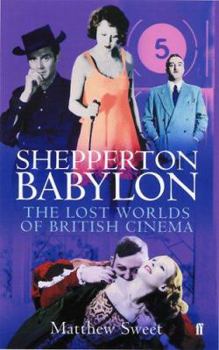Shepperton Babylon: The Lost Worlds of British Cinema
Select Format
Select Condition 
Book Overview
This is a wonderful secret history of British movies that includes the scandals, the suicides, the immolations and the contract killings - the product of thousands of conversations with veteran... This description may be from another edition of this product.
Format:Paperback
Language:English
ISBN:0571212980
ISBN13:9780571212989
Release Date:January 2006
Publisher:Faber & Faber
Length:400 Pages
Weight:0.80 lbs.
Customer Reviews
2 ratings
Strange England
Published by Thriftbooks.com User , 17 years ago
Out of the hundreds of sordid revelations this book provides I have time to tell you about only one or two or three, but suffice it to say that Sweet's SHEPPERTON BABYLON is not really a British version of Kenneth Anger's expose, for this is a book with much more of a critical apparatus, and it seems that its main purpose is to turn upside down every received idea about 20th century British cinema, proving that the panned movies are the great ones and the "great" movies are the horrid ones. Idolized stars like Dirk Bogarde and Lawrence Olivier get it in the neck (he says John Mills' secret is that "the man cannot act") while the careers of minor players are examined at great length and with a sympathetic detail that inevitably makes them seem like keys to a great secret. While the book had some dry patches--particularly Sweet's attempt to invest the era of "quota quickies" with artistic significance--I absorbed the whole thing as though caught in some ineffable spring rain in rocky Exmoor. I write as one who knows so little about the British cinema that I have no received ideas. Once or twice I found myself reeling, for I suppose from what I understand that there was a class of movies called "Ealing comedies," most of them starring Alec Guinness, and at one time they were hailed as the greatest UK pictures ever made, but more recently they're been dismissed as reactionary, smug little Cold War fantasies, and now here comes Sweet again to revive their reputation. That's one too many twists for me! I guess in the end the stories I will remember will be the ones that most resemble the Kenneth Anger book, the "film studio horror" in which a starlet dressed in a celluloid gown went up in flames and burned before everyone's eyes--or the story of Meggie Albanesi, the affecting Luise Rainer type who died with no inside, and the man who loved her, Basil Dean, who tried to make her over again with a less talented actress, the inglorious Victoria Hopper. Hopper was in retirement and must have been 90 when Matthew Sweet found her. She hadn't appeared in a film since 1938. "Victoria Hopper knows the story [of Meggie Albanesi[," writes Sweet, "and knows she owes her first marriage and her career to it. Her biography has a strong flavour of TRILBY; the Albanesi connection gives it a touch of VERTIGO." No kidding! The book makes me long to see the "dreadful" big budget 1930s movies Dean produced and directed in which he "starred" Victoria Hopper--THE CONSTANT NYMPH, LORNA DOONE, and WHOM THE GODS LOVE! Where do we get our tickets to go into the time machine and experience these ISHTAR-sized disasters as they made the rounds of their original curtailed engagements? I'd also like to see some movies made by the two comedians Matthew Sweet seems to revile beyond all other citizens of the world, George Formby and Norman Wisdom. They seem sort of like our own Don Knotts from the way he describes them, and if there is a cinema Valhalla, Don Knotts reigns
A Real Eye-Opener . . .
Published by Thriftbooks.com User , 17 years ago
Read this book and discard forever the idea that the denizens of British cinema were in any way less colourful or bizarre than their Hollywood counterparts. Sweet doles out gossip, hard fact, and criticism in judicious proportions. His writing is delightful, whether he is describing movies as "a window into the lives of the dead", or sketching an unforgettable portrait of J. Arthur Rank ("He was a tall, bulky man whose crumpled face and pendulous nose gave him the appearance of a proboscis monkey emerging from an old paper bag."). His interviews with film-makers from as far back as the early 1920s preserve insights which would otherwise have been lost. However, since his subject is "the LOST worlds of British cinema," he intentionally scants the very familiar in favour of the obscure: for example, there is little here on the Ealing comedies, and much on forgotten exploitation movies of the 1960s and 70s. Nevertheless, I can scarcely imagine a more entertaining introduction to the history of British film.




